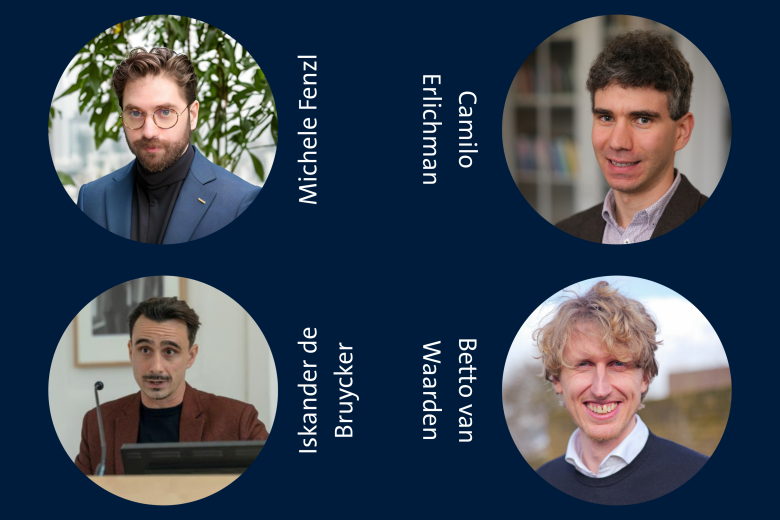How to prevent a total collapse of the healthcare system
It sounds ominous, but the numbers don’t lie: within 10 years the Dutch healthcare system could face collapse, with no guarantee that people will receive the care they need. Nursing home care is set to be hit hardest. Yet despite these forecasts, full professor Angelique de Rijk and assistant professor Petra Erkens, both researchers at Care and Public Health Research Institute (CAPRHI) of Maastricht University, remain optimistic. “There are so many levers we can pull.”
According to FNV Zorg & Welzijn, by 2034 the shortage of healthcare professionals will have risen to 265,600. In nursing home care alone, the shortfall is expected to reach 82,900, compared with 16,100 today. While patient numbers are steadily rising due to an ageing population, the supply of professionals is decreasing. Older people are also living longer and often need more complex care. The challenge is clear.
Under the radar
Of course, this looming crisis hasn’t come out of the blue. The system has been creaking for years, and shortages are already causing problems. In elderly care, the strain is felt most by nurses and caregivers, says Angelique de Rijk, professor of Work and Health.
“Take a district nurse who doesn’t have enough time to complete a task properly, so doesn’t quite stick to the guidelines,” she says. “Or a team where one person is off sick, on top of an existing shortage. The work just gets redistributed somehow.” That such gaps are patched up in countless ways on the work floor means that problems largely fly under the radar.
Petra Erkens, assistant professor at the Living Lab in Ageing and Long-Term Care, knows from colleagues in the field that essential care isn’t always available when someone’s health suddenly deteriorates. “It means much more is being asked of informal carers. A partner, son or daughter.”
Leaving the sector
When professionals can’t deliver the level of care they would like to, some leave the sector altogether. “Nurses and carers usually choose this profession for the contact with patients,” says Erkens. “If you lose that because you have too many tasks or clients, it becomes very difficult.”
Losing specially trained staff to other sectors is a real shame, De Rijk adds. “Recent research among young nurses at Maastricht UMC+ shows they can cope with high workloads, especially when there are good career prospects. But managers need to recognise this more.”
Recognition matters
One of her students investigated stress prevention among Belgian healthcare workers. The results show that recognition can come in surprisingly small ways. “Eating together, sending a thank-you email, arranging a food truck on staff day …” Such gestures help employees feel seen, which boosts motivation and productivity.
Erkens also stresses the value of professional development opportunities in retaining staff. “We increasingly involve caregivers and vocationally trained nurses in our research, through combined positions. It’s a win-win situation: they broaden their horizons, and we gain valuable insights.”
“Eating together, sending a thank-you email, arranging a food truck on staff day …” Such gestures help employees feel seen, which boosts motivation and productivity.
Attracting new workers
At the same time, new workers are urgently needed—no easy task when student numbers have been falling. “That’s why there’s now a focus on more flexible ‘learning and working,’” explains Erkens. “People can get started with partial certificates, which lowers the entry threshold.” De Rijk points out that nearly one million people with occupational disabilities are currently sidelined in the Netherlands, but could do support work. “The government should also make it easier for people to retrain through targeted subsidies.” Demand for care Efforts are under way to reduce reliance on professional care, including through technology and informal caregivers. “But we shouldn’t imagine technology can solve everything,” De Rijk warns. “Otherwise all the money will just flow to tech companies. And informal carers are already stretched thin. We need to pull several levers at once. There’s no magic pill.” She and her colleagues have developed a model for addressing labour shortages in healthcare, mapping out which levers can be pulled.
Prevention is another key: tackling chronic illness through healthier lifestyles and diet, though the impact will only be seen in the long term. At the same time, there is a shift towards appropriate care, focused on quality of life. “Sometimes things are done out of routine that aren’t really necessary. Regular bladder irrigation, for example, even though it hasn’t been proven to reduce the risk of urinary tract infection,” Erkens says. “Artificial intelligence can help by analysing patient data and spotting complications early, so we only deliver care that’s really needed.”
Both agree that appropriate care also requires reorganising the healthcare system. De Rijk: “Who’s the first professional you speak to? Can that person assess where you need to go, or do you get shuffled from one place to the next?” There’s a wider social responsibility, too: “If you really want to support professionals and informal carers, you need to organise childcare and public transport better.”
Positive signs
Despite the challenges, neither looks to 2034 with dread. Solutions are already emerging. “I hope and expect that we’ll take a broader view of who can work in healthcare. Not just looking at the diploma, but at people’s qualities,” Erkens says.
“What makes me optimistic,” says De Rijk, “is that working conditions and employment terms are finally high on the agenda. We already know a lot about this. Now that the urgency is clear, we can share that knowledge more widely.”
Text: Jolien Linssen
Photography: Paul van der Veer
Also read
-
Four FASoS researchers awarded NWO XS grants
How do lobbyists use disinformation to sway policymakers? Who gets to shape the historical narrative of occupation and violence? Does growing inequality change the way citizens think about politics? And how have politicians defended “truth” across a century of media revolutions?
-
Reducing the Digital Divide: Empowering Students to Train, Evaluate, and Use AI Text Models
The Maastricht Law and Tech Lab, together with the Brightlands Institute for Smart Society (BISS), obtained a € 100.000 a Comenius Senior Teaching Fellow grant.
-
Green school playgrounds boost concentration and wellbeing
Children at schools with green playgrounds are better able to concentrate and display more social behaviour. This is the conclusion of a follow-up study within the long-running project The Healthy Primary School of the Future .